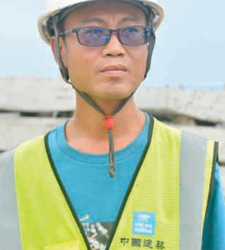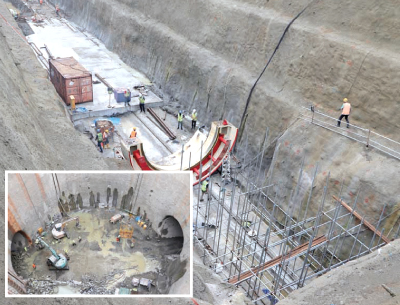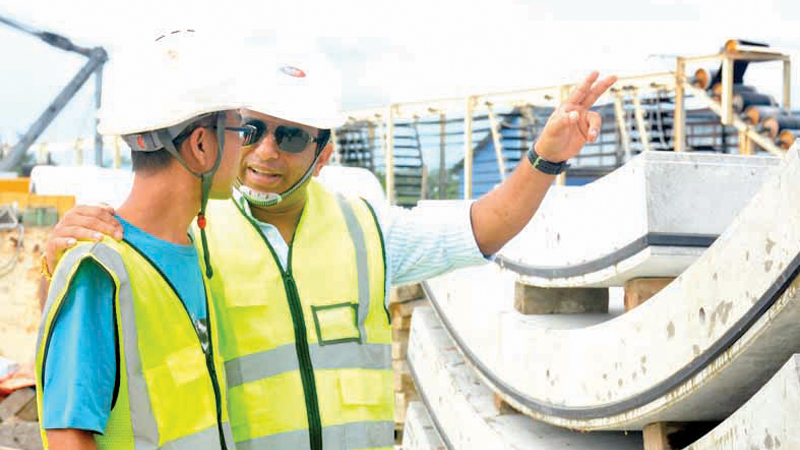One of the biggest rural irrigation development projects, the North Central Province Canal Project (NCPCP) funded partly by the Asian Development Bank (ADB) is now moving ahead aggressively and is due to be completed by the end of next year.
Construction work is estimated to cost U.S. dollars 244 million and is also financed by the Government.

Director
Jie Shun Tong
A 28 km underground channel would be built to transfer water between the Kalu Ganga reservoir and the Moragahakanda reservoir under this project.
The 28 km-long tunnel which is Sri Lanka’s longest irrigation tunnel is being constructed by the China State Construction Engineering Corporation Ltd (CSCEC) and was launched in February 2021.
The first tranche of the NCPCP planned a 103.5 km distance canal that covers three main farming districts Matale, Polonnaruwa and Anuradhapura.
The project consists of five contract packages and the UEC-ICB 2A is the most important contract that consists of tunnels about 27 km long.
The contact package was awarded to China State Engineering Corporation Ltd in February 2021. It was planned to deploy two Tunnel Boring Machines (TBM) (from the Northern and Southern portals) to bore the proposed 27 km tunnel.
The proposed TBM parts that will be introduced through the northern portal were imported by the contractor, who has already completed the on-ground assembling of the TBM parts.
Economic benefits
Tunneling from the first TBM from the Northern shaft area started in 2021 and the construction is ongoing successfully, and work on the second TBM also commenced.
The project will help to usher a new era for the agricultural sector as it provides water on a regular basis.
The youth who are working with the Chinese company also gain knowledge on novel construction techniques and their experience would permit them to secure obs overseas.

Assistant Director
Dineth Viduranda
The temples and schools in the area also received many benefits from this projects through several CSR initiatives that were launched by CSCEC which included providing additional infrastructure to temples and education material to schoolchildren.
The bridges and the culverts proposed for the access road for the Northern tunnel portal, are being constructed, under the UEC -ICB 2A contract package.
The villagers who found it difficult to fund their day-to-day life also received major financial benefits when construction work commenced.
“First, our youth gained employment while villages also sold their fruit and vegetables to site employees and got additional income,” a villager said.
In addition, several sub contracts were provided helping people to set up small companies of their own.
Opportunity for students to study the project
Engineering and university students from all over Sri Lanka were also given the opportunity to visit the site and study the new technology.
The ADB also supported agricultural activities in Dambulu- Halmillawa and Pubbogama areas under the Hurulu positha Agrarian Service Centre (ASC).
The Chinese construction company, China State Construction Engineering Corporation Ltd which is adhering to strict safety and environmental controls during the ongoing construction also was engaged in the reforestation activity carried out at the Thumbikulama forest reserved area.
 This was done on a recommendation of the Environment Impact Assessment Report approved for the North-Central Province Canal project, and a Memorandum of Understanding (MoU) was also signed aiming at reforestation and enrichment planting of 500 ha in the project impact areas in the Anuradhapura and Polonnaruwa districts.
This was done on a recommendation of the Environment Impact Assessment Report approved for the North-Central Province Canal project, and a Memorandum of Understanding (MoU) was also signed aiming at reforestation and enrichment planting of 500 ha in the project impact areas in the Anuradhapura and Polonnaruwa districts.
This was initiated with 100 ha in 2022 by planting indigenous species 50 ha each in the Anuradhapura and Polonnaruwa districts.
As of January 15, 2023, 30 ha in Palugaswewa DSD in the Anuradhapura district has been planted with 30,000 plants. It is planned to continue and complete the entire 100 ha of reforestation and enrichment planting program with the onset of monsoon rains last year.
The maintenance of the area will be done till this year by the contractor, and MWSIP plans to hand over the site to the FD by the end of this year.
When completed, the agro sector would be the main beneficiary of this project and through this it will play a major role towards providing food security to all Sri Lankans.




